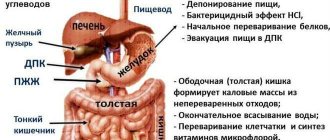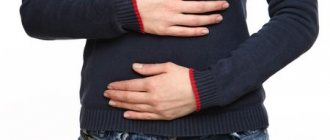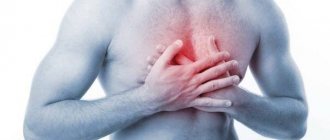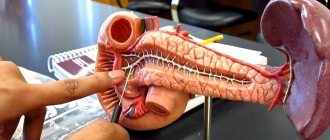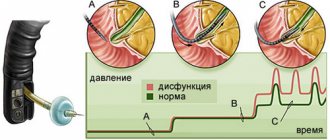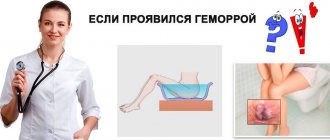The intestine is part of the digestive system, an organ of digestion and elimination, starting with the duodenum and ending with the anus. The intestine is located in the abdominal cavity and consists of the small intestine (includes the duodenum, jejunum, ileum) and the large intestine (includes the cecum, ascending, transverse, descending, sigmoid, rectum).
The main function of the small intestine is to absorb nutrients.
The large intestine is responsible for absorbing fluid and preparing and transporting the stool.
Medicine distinguishes between intestinal disorders and intestinal diseases.
Let's list the intestinal disorders:
- Flatulence is an excessive accumulation of gases in the intestines.
- Diarrhea is a symptom of intestinal dysfunction with abdominal pain and the release of liquid and semi-liquid feces.
- Constipation is difficulty in bowel movements.
- Dyskinesia of the small intestine is a functional disorder consisting of increased or decreased peristalsis (contraction of the walls). As a rule, it is caused by diseases of other abdominal organs (liver, stomach, etc.). Symptoms of increased peristalsis are mild pain, rumbling in the abdomen, and loose stools. Symptoms of weakened peristalsis: feeling of heaviness, bloating, pain in the navel.
- Irritable bowel syndrome (dyskinesia, spastic bowel, mucous colitis) is a disorder of colon motility. Symptoms are vague: rumbling in the stomach, diarrhea and constipation.
- Dysbacteriosis is a disruption of the normal composition of the microflora of the small and large intestines due to poor nutrition, intestinal infections, and the use of antibiotic drugs. Symptoms: bloating, abdominal pain, loss of appetite, nausea, belching, vomiting, diarrhea.
Among the common diseases of the small and large intestines are the following:
- Allergic reaction of the small intestine. Occurs due to consumption of foods containing allergens. Symptoms: abdominal pain, nausea, vomiting, diarrhea.
- Celiac disease or celiac enteropathy is an immune reaction to gluten (a protein found in wheat, rye, and barley). Symptoms: general weakness, diarrhea, weight loss, etc.
- Maldigestion and malabsorption are pathologies in which the digestion and absorption of certain nutrients is impaired. Symptoms: bloating, flatulence, abdominal pain, diarrhea, weight loss.
- Enteritis (catarrh) is inflammation of the walls of the small intestine mucosa. Caused by bacteria and viruses in food, certain medications, or radiation therapy. Symptoms of enteritis are: loss of appetite, vomiting, diarrhea, abdominal pain.
- Gastroenteritis – simultaneous inflammation of the stomach and small intestine – abdominal pain, vomiting, diarrhea.
- Duodenal ulcer is hypersecretion of gastric juice that enters the intestine. Ulcers also often occur due to infection or taking anti-inflammatory drugs. Symptoms of an ulcer are pain in the upper abdomen on an empty stomach with relief after eating, belching, and bloating.
- Intestinal obstruction is a pathology in which the movement of food through the intestines is disrupted. Symptoms: lack of bowel movements and gas, bloating, abdominal pain, nausea, vomiting feces.
- Diverticulitis is inflammation of a diverticulum (a small pouch-like protrusion of the intestinal wall). It is characterized by symptoms similar to those of appendicitis: pain in the lower abdomen, high fever, and sometimes bleeding.
- Ilbitis (Crohn's disease) is an inflammation of the ileum (the last part of the small intestine) that affects the entire digestive tract. Doctors do not know the causes of this disease. Symptoms: constant or intermittent diarrhea with abdominal pain, often obstruction, fever, skin rashes.
- Ischemia occurs due to poor circulation in the small intestine. Causes: narrowing of the lumen of the mesenteric arteries by atherosclerotic plaques. Symptoms of acute ischemia: sudden severe abdominal pain, pain when pressed, nausea and vomiting, fever, blood in the stool. Symptoms of chronic ischemia are abdominal pain after eating for 1-3 hours, which intensifies over several months, bloating, nausea, vomiting, diarrhea, and weight loss.
- Sometimes, in severe cases, when blood flow stops, an infarction of the small intestine develops - mesenteric thrombosis.
- Cancer (malignant tumors) of the small intestine comes in such forms as adenocarcinoma, lymphoma and sarcoma.
- Ulcerative colitis is a lesion of the mucous membrane of the colon and rectum. The causes have not been established. Symptoms: frequent diarrhea, pain in the left side of the abdomen, sometimes bleeding, weight loss, weakness.
- Colon diverticulum is a stretching of the intestinal wall with the formation of a “pocket” protruding into the abdominal cavity. Causes: chronic constipation, weak intestinal wall tone. Symptoms: high fever, abdominal pain, diarrhea with blood and mucus.
- Typhlitis is an inflammation of the cecum. Causes: food allergies, parasites, infections, dysbiosis, etc. Symptoms: diarrhea and vomiting, rumbling and abdominal pain, enlarged intestines, etc.
- Lazy bowel syndrome is a pathological condition with impaired motor-evacuation function of the colon. Reasons: sedentary work, ignoring urges, digestive disorders, pregnancy, stress, etc. Symptoms are: headache, poor appetite, nervousness, skin rash, bloating and heaviness in the stomach, difficulties with emptying.
- Colitis (catarrh) - inflammation of the mucous membrane of the colon (the longest and most important part of the large intestine) - sharp abdominal pain, alternating diarrhea and constipation, severe malaise, sometimes fever.
- Colon cancer. The main factor is poor nutrition, based on refined foods and additives.
Psychosomatics: stomach
When the stomach hurts, it is psychosomatics that most often becomes the cause of trouble. The term implies an inextricable connection between the emotional and organ principles of a person.
Psychosomatics explains any indigestion due to the overly strong influence of negative emotions. Therefore, it is necessary to carefully monitor everything that the brain perceives and consciously limit any negative information.
Most often they affect silent and uncommunicative people who prefer to experience everything within themselves. They are the ones most often affected by various psychosomatic diseases. As already mentioned, the stomach is one of the most noticeable places in them. The more people chew unpleasant information, the greater its impact on the digestive system.
If emotions are also not expressed and rejected, the gastrointestinal tract, starting with the esophagus, is subject to severe influences. The human body is screaming for help, and if the individual does not provide it to himself, then pathology may develop.
Body and soul
Each of us has once experienced pain and discomfort in the stomach area. Having felt that a problem with this important digestive organ is brewing or has already matured, we first of all turn to a doctor. After all, who will help find the cause and make a diagnosis? Only a doctor. But, unfortunately, they often do not take into account such a factor as psychosomatics, looking for external causes of pathologies, while they may be concentrated internally. If you have a stomach ache, psychosomatics often plays a key role in this.
How does the psyche affect health?
Many emotions entail muscle tension, which can be so strong that it causes, as psychosomatics explains, pain in the stomach, because not only striated muscles react, but also smooth muscles.
The more a person tries to suppress his negative feelings, the more pronounced the body’s response is. Gastritis, peptic ulcers and even oncology are largely provoked by psychosomatic factors.
Scientists believe that the occurrence of diseases is explained by the desire of the stomach to digest not only food, but also any information coming from the outside. If it causes unpleasant emotions to a person, the organ immediately responds to them with special physiological reactions.
Emotions and stomach diseases
If stomach problems are caused precisely by negative emotions, then you will probably need the following list to help you determine the nature of these emotions. So, the psychosomatics of stomach diseases will be discussed further. Inflammation in the named organ - gastritis - usually occurs against the background of a conflict in the sphere of feelings: the ability to take responsibility, grow up, and find a way out of insoluble conflicts. When we do not see the internal conflict, it descends to a rougher form - physical, in order to force the brain to pay attention to itself.
Or you do not have a sufficient sense of self-preservation. Infancy causes you to give up trying to protect yourself.
However, there is another way of developing gastritis - aggressive. When you are consumed by unexpressed anger, the hydrochloric acid of the stomach, which is very aggressive by nature, becomes even more concentrated. The mucous membrane does not cope with its protective function. This suggests that you are unable to forgive and forget the offense. If you tend to bottle up grievances within yourself, it immediately becomes clear why your stomach hurts: psychosomatics played an important role here.
Some direct aggression inward, while outwardly remaining calm and even peaceful. But lava spills inside, which harms, first of all, themselves. This could be a reaction to events or simply anger at yourself due to failure or low self-esteem. Others freely express their aggression. But this does not help either, because conflict situations are constantly repeated. Ultimately, it culminates in gastric ulcers. This is obvious psychosomatics: the stomach is eating away at itself.
If any of the above emotions are suffocating you, it is not surprising that one of the above diagnoses soon arises. Moreover, it is these emotions that can lead to stomach tumors.
Psychosomatic causes of stomach diseases
Unhealthy experiences sooner or later lead people to change the functioning of the entire digestive system.
Stomach ulcers are most often caused by:
- suspiciousness;
- alertness;
- hypochondria;
- low self-esteem;
- ill will;
- desire for competition;
- tendency to resist;
- longing, etc.
Gastritis most often occurs due to the inability to submit to the situation, constant stress about a job not done well, and anxiety. Long anticipation of troubles, an inferiority complex, and fear of the future also often become the causes of the development of the disease.
Heartburn can be caused by constant dissatisfaction, a feeling of excitement, and sadness. Long-term stress affecting a person often serves as an impetus for the development of gastric disorders, accompanied by diarrhea.
Nervous tension combined with an unbalanced diet inevitably leads to the development of pathology of the digestive system
What causes growths (polyps)
The uterus is the most vulnerable female organ. It reflects all the negativity from relationships with men. Resentment, anger, irritation, pain, negative thoughts - all this becomes the cause of uterine diseases.
Polyps after childbirth
Polyps occur frequently during or after pregnancy. It's all about hormonal changes that occur throughout the entire period of bearing a child and after childbirth.
Pathology in menopause
Menopause is also often accompanied by polyps. The reason is the same – hormonal changes in the body. The likelihood of developing the disease is higher if a woman is constantly exposed to stress and is characterized by emotional and mental instability. Women prone to depression get sick even more often. In addition, they have a higher risk of transition from benign to malignant.
How to deal with this problem
Not only a gastroenterologist, but also a psychotherapist will help to overcome the development of psychosomatic stomach syndromes. He will teach you how to structure various experiences and show you ways to overcome stress and complexes.
Among the many negative emotions, the specialist will highlight those that directly affect the digestive system and will make the treatment prescribed by the doctor comprehensive, with an individual focus.
He will teach various techniques that will make it possible to take control of negative experiences and outline ways to quickly recognize dangerous situations in order to prevent them.
The psychologist will recommend a set of preventive measures to avoid exacerbations of stomach diseases. If all prescribed measures are fully followed, even tumors can be cured.
Therefore, there is no need to rely only on drug therapy, since in the event of a psychosomatic illness developing, it will be exclusively symptomatic.
Mechanisms of education
Under the influence of certain factors, the mucous membranes of the rectum reduce their excretory and secretory functions due to cell death.
The body tries to compensate for the loss by continuous division of new cells, which forms certain layers, which are usually called tumors, mucous growths, polyps. Villous polyps of the rectum pose a particular health hazard.
The polyps themselves do not affect the patient’s condition, but contacting a doctor is necessary if there is a persistent change in health and the following symptoms appear:
- Atypical discharge from the rectal canal (blood, mucous components, pus, copious serous exudate);
- Weeping discharge, regardless of the process of defecation (wetting of underwear);
- The development of iron deficiency anemia due to bleeding (damage to the polyp with feces often leads to its bleeding);
- Pain during bowel movements;
- False urge to have a bowel movement;
- Abnormal stool.
What are rectal polyps, watch in this video:
Such new growths are here to stay. Unfortunately, no traditional methods or conservative medicine can eliminate polyposis lesions, so the only adequate treatment method is surgery.
Find out in this article whether polyps can break off on their own in the intestines.
You can make an appointment with a doctor directly on our website.
The intestine is part of the digestive system, an organ of digestion and elimination, starting with the duodenum and ending with the anus. The intestine is located in the abdominal cavity and consists of the small intestine (includes the duodenum, jejunum, ileum) and the large intestine (includes the cecum, ascending, transverse, descending, sigmoid, rectum).
The main function of the small intestine is to absorb nutrients.
The large intestine is responsible for absorbing fluid and preparing and transporting the stool.
Medicine distinguishes between intestinal disorders and intestinal diseases.
Let's list the intestinal disorders:
- Flatulence is an excessive accumulation of gases in the intestines.
- Diarrhea is a symptom of intestinal dysfunction with abdominal pain and the release of liquid and semi-liquid feces.
- Constipation is difficulty in bowel movements.
- Dyskinesia of the small intestine is a functional disorder consisting of increased or decreased peristalsis (contraction of the walls). As a rule, it is caused by diseases of other abdominal organs (liver, stomach, etc.). Symptoms of increased peristalsis are mild pain, rumbling in the abdomen, and loose stools. Symptoms of weakened peristalsis: feeling of heaviness, bloating, pain in the navel.
- Irritable bowel syndrome (dyskinesia, spastic bowel, mucous colitis) is a disorder of colon motility. Symptoms are vague: rumbling in the stomach, diarrhea and constipation.
- Dysbacteriosis is a disruption of the normal composition of the microflora of the small and large intestines due to poor nutrition, intestinal infections, and the use of antibiotic drugs. Symptoms: bloating, abdominal pain, loss of appetite, nausea, belching, vomiting, diarrhea.
Among the common diseases of the small and large intestines are the following:
- Allergic reaction of the small intestine. Occurs due to consumption of foods containing allergens. Symptoms: abdominal pain, nausea, vomiting, diarrhea.
- Celiac disease or celiac enteropathy is an immune reaction to gluten (a protein found in wheat, rye, and barley). Symptoms: general weakness, diarrhea, weight loss, etc.
- Maldigestion and malabsorption are pathologies in which the digestion and absorption of certain nutrients is impaired. Symptoms: bloating, flatulence, abdominal pain, diarrhea, weight loss.
- Enteritis (catarrh) is inflammation of the walls of the small intestine mucosa. Caused by bacteria and viruses in food, certain medications, or radiation therapy. Symptoms of enteritis are: loss of appetite, vomiting, diarrhea, abdominal pain.
- Gastroenteritis – simultaneous inflammation of the stomach and small intestine – abdominal pain, vomiting, diarrhea.
- Duodenal ulcer is hypersecretion of gastric juice that enters the intestine. Ulcers also often occur due to infection or taking anti-inflammatory drugs. Symptoms of an ulcer are pain in the upper abdomen on an empty stomach with relief after eating, belching, and bloating.
- Intestinal obstruction is a pathology in which the movement of food through the intestines is disrupted. Symptoms: lack of bowel movements and gas, bloating, abdominal pain, nausea, vomiting feces.
- Diverticulitis is inflammation of a diverticulum (a small pouch-like protrusion of the intestinal wall). It is characterized by symptoms similar to those of appendicitis: pain in the lower abdomen, high fever, and sometimes bleeding.
- Ilbitis (Crohn's disease) is an inflammation of the ileum (the last part of the small intestine) that affects the entire digestive tract. Doctors do not know the causes of this disease. Symptoms: constant or intermittent diarrhea with abdominal pain, often obstruction, fever, skin rashes.
- Ischemia occurs due to poor circulation in the small intestine. Causes: narrowing of the lumen of the mesenteric arteries by atherosclerotic plaques. Symptoms of acute ischemia: sudden severe abdominal pain, pain when pressed, nausea and vomiting, fever, blood in the stool. Symptoms of chronic ischemia are abdominal pain after eating for 1-3 hours, which intensifies over several months, bloating, nausea, vomiting, diarrhea, and weight loss.
- Sometimes, in severe cases, when blood flow stops, an infarction of the small intestine develops - mesenteric thrombosis.
- Cancer (malignant tumors) of the small intestine comes in such forms as adenocarcinoma, lymphoma and sarcoma.
- Ulcerative colitis is a lesion of the mucous membrane of the colon and rectum. The causes have not been established. Symptoms: frequent diarrhea, pain in the left side of the abdomen, sometimes bleeding, weight loss, weakness.
- Colon diverticulum is a stretching of the intestinal wall with the formation of a “pocket” protruding into the abdominal cavity. Causes: chronic constipation, weak intestinal wall tone. Symptoms: high fever, abdominal pain, diarrhea with blood and mucus.
- Typhlitis is an inflammation of the cecum. Causes: food allergies, parasites, infections, dysbiosis, etc. Symptoms: diarrhea and vomiting, rumbling and abdominal pain, enlarged intestines, etc.
- Lazy bowel syndrome is a pathological condition with impaired motor-evacuation function of the colon. Reasons: sedentary work, ignoring urges, digestive disorders, pregnancy, stress, etc. Symptoms are: headache, poor appetite, nervousness, skin rash, bloating and heaviness in the stomach, difficulties with emptying.
- Colitis (catarrh) - inflammation of the mucous membrane of the colon (the longest and most important part of the large intestine) - sharp abdominal pain, alternating diarrhea and constipation, severe malaise, sometimes fever.
- Colon cancer. The main factor is poor nutrition, based on refined foods and additives.
Psychosomatics of the disease according to Louise Hay, Liz Burbo, Sinelnikov
The famous foreign author Louise Hay points out that the overwhelming number of various diseases of the digestive system are caused precisely by the action of a psychological factor.
She names the main causes of stomach pathologies. These include, in her opinion, constant anticipation of trouble, fear, panic attacks, etc.
The main symptoms of diseases of the digestive system are pain, heartburn, and vomiting. They are provoked by a constantly felt sense of threat from the outside. To get rid of it, it is useful to repeat the phrase: “My breathing is calm, I fill my lungs with clean air. Life has nothing bad in store for me.”
Often a person is also bothered by spasms. To treat them, the author advises resorting to various internal motivations that will help avoid unnecessary internal stress. The phrases should be repeated: “My existence does not pose any threat. I'm not afraid of change. Everything will be fine".
Among the diseases that most often arise under the influence of psychosomatic causes, Hay identifies gastritis. It is provoked by prolonged stay in a state of anxiety and fear. Therefore, you need to influence your own psyche by saying: “I love my body. I'm happy with myself. I'm not in any danger."
Peptic ulcer disease can be triggered by aggressiveness, low self-esteem, inability to accept life, and a constant feeling of guilt. This is where it helps to say, “I’m fine. My soul is calm. Everything gonna be alright".
The opportunity to overcome stomach diseases caused by psychosomatics is offered by Liz Burbo. She describes certain stages of dealing with them, leading to the patient’s complete recovery.
Here is their sequence.
- A person clearly understands the characteristics of his internal state. He evaluates his feelings, is aware of the symptoms, and analyzes treatment options.
- He tries to understand at what point in his life the pathology developed and what emotions he experienced. It is definitely worth identifying dissatisfaction, fear, anxiety, experiencing them and trying to get rid of them. It is also necessary to check how psychotherapy affects overall well-being.
- In order to avoid relapses of the disease, it is necessary to form a new worldview in which there will be no place for previous negative emotions. You should ensure that the symptoms gradually disappear.
- It is required to achieve complete recovery, confirmed by a doctor. Psychological prevention should become an everyday occurrence for the patient. It is necessary to study yourself and fully satisfy your immediate needs. If any discomfort occurs, you need to return to the first stage of treatment.
A significant contribution to the treatment of stomach pathologies was made by the domestic specialist, psychologist, and psychosomatics specialist V. Sinelnikov.
It directly connects the occurrence of various diseases with constant nervous overstrain. Most often, gastrointestinal pathologies provoke the development of constipation, nausea, and rumbling in the abdomen. They arise from people who strive to please everyone. A person does not take into account his own emotions, destroying the body. Belching, diarrhea, vomiting, which are a symptom of many diseases of the digestive system, are most often caused by helplessness, impotence, dependence on others, and fear.
In order to overcome an illness, internal discipline and the maximum exclusion of any negative experiences from everyday existence are required.
Psychosomatics: polyps in the uterus
Polyps are multiple formations on the lining of the uterus. May be benign or malignant. Any neoplasms require medical supervision and treatment. Polyps larger than 18 mm must be surgically removed.
Psychology believes that the reason for the development of polyposis is a woman’s unshed tears and a feeling of self-pity. She constantly suffers in relationships with men, she is offended, cheated on, betrayed. At the same time, the woman herself does not understand why she is treated this way. She doesn't understand why she can't be a good mother and a happy wife. All she can do is feel sorry for herself and cry silently.
The victim mentality is formed during childhood, but changes can occur during adolescence or adulthood. What precedes the development of psychosomatics:
- problems with gender identity;
- conflicts with parents or one of them;
- lack of love, attention, care;
- fear of pregnancy;
- dependent relationships in which the woman suffered humiliation;
- denial of femininity;
- overprotection and excessive control from parents or a man from a previous relationship;
- negative attitude towards pregnancy and children.
Healing Methods
Any treatment for gastric pathologies will not be sufficient if the psychosomatic causes that cause them are not dealt with. In addition to taking medications prescribed by a gastroenterologist, constant emotional hygiene is necessary.
The impact on the neuropsychic sphere should be as constant as on the physical one. Only a comprehensive set of measures can lead to a complete recovery of the patient.
Modern man cannot hide from the stress that haunts him. Therefore, you need to constantly work on yourself in order to develop a more balanced attitude towards life.
When he completely masters himself and learns to get rid of negative experiences, not suppressing, but changing his attitude towards them, only then stomach diseases will recede.
Psychological characteristics and stomach diseases
In the diagnosis of stomach diseases, the psychological characteristics of patients take place. If you have any of the following traits, it may be time to try changing your personality:
- Laziness. Because of it, all organs begin to work worse - like us, they are “lazy.” Over time, if you don't do anything to turn laziness into activity, digestion worsens due to decreased gastric acid production.
- Irritability. This is how anxiety manifests itself when interacting with the outside world; the stomach also reacts psychosomatically to it, which, in turn, increases the tendency to irritability.
- Frustration, depression, apathy, indifference to everything that happens around, slows down the work of all organs that are actively involved, including the stomach. This is the psychosomatics of atrophic gastritis, which causes depletion of the body.
- Cruelty and selfishness. Surprisingly, the stomach almost always suffers from these emotions. If you demand too much from people, especially your loved ones, coldness will eventually develop in the relationship. And then psychosomatics appears - the stomach instantly reacts to the lack of harmony in the relationship.
- Despair and resentment. Heavy karma ultimately results in many problems that have to be overcome with great difficulty. If a person realizes his mistakes and believes that everything will soon return to normal, over time he will work off karma. But the lack of understanding and acceptance contributes to the formation of resentment towards fate. Feelings of despair and hopelessness appear until you understand why exactly these events are happening around you.
Houston, we have a problem.
Think about it, all organs receive signals from the brain. And the brain works without stopping for a second. It constantly reads and remembers the surrounding environment, records the mood and reaction to a particular stimulus - and distributes all this throughout the body:
- the area of the mouth and throat receives information about what you wanted to say, but never said;
- the reproductive system receives information about whether you like yourself today (and always) or not;
- and in the stomach area information comes mainly about emotions, whether you were able to cope with them, “digest” them or not.
This is how psychosomatics begins. It's simple.
How does psychosomatic gastritis develop?
The influence of the patient’s state of mind on the functioning of the stomach is associated with several factors:
- In a stressful situation, adrenal hormones are actively produced , designed to mobilize all the body’s forces to fight. However, one of the effects of excessive concentration of these hormones in the bloodstream is the formation of ulcers and erosions of the gastric mucosa. Against the background of chronic stress, the risk of ulcer formation increases significantly, and formed erosions are difficult to treat.
- The digestive system has extensive innervation - 100 million nerve cells interconnected by numerous fibers. This is the metasympathetic (enteric) nervous system. In medical literature it is even called the “second brain.” It is believed that while the brain is responsible for thoughts, the abdominal brain is responsible for emotions. That is why he is so sensitive to changes in psychological background. For example, prolonged stress causes spasms of the smooth muscles of the stomach, which leads to a decrease in blood flow in the mucosa, and then to its atrophy.
- A pathological reaction to unfavorable conditions – the habit of “eating” stress – also contributes to disruption of the digestive tract. The stomach cannot cope with the increased load, as a result of which its motility and secretion suffer, and an inflammatory reaction develops.
Psychosomatics for different types of gastritis
It is believed that different negative emotions have different effects on the functioning of the stomach.
Hyperacid gastritis usually develops in people with a hypertrophied sense of responsibility, who tend to blame themselves for all failures. This applies, in particular, to workers who are responsible for the life and health of people: pilots, machinists, air traffic controllers, rescuers, doctors. They are characterized by increased anxiety and internal tension, even if it does not manifest itself externally.
Hypoacid gastritis affects dependent, driven patients who do not want to be responsible for their lives and their actions, but prefer to simply go with the flow, relying on circumstances and the people around them. Against the background of infantility and lack of initiative, the functional activity of the digestive tract also decreases.
Gastritis with a normal level of acidity is typical for active, versatile people who have a lot of hobbies and interests. Despite the fact that such individuals usually achieve success in all endeavors, sometimes this burden turns out to be too heavy for them and the disease develops even against the background of positive emotions.
Peculiarities. This type of gastritis is typical for teenagers who are looking for themselves in life, quickly change hobbies, communicate in different companies and receive a huge amount of new information every day. That is why parents need to pay attention to the activities of their son or daughter and make sure that they do not overload themselves. For the same reason, it is not recommended to enroll children in five clubs and English language courses at once - everything is good in moderation.
Disputes about the psychosomatics of gastritis
Since ancient times, the influence of psychological state on the development of diseases and the speed of recovery of patients has been known. However, for a long time, scientists assigned emotions only the place of one of the risk factors, which can aggravate the course of the disease, but do not become the main cause of its occurrence.
Nowadays, medicine has accumulated enough data on the occurrence of certain pathological conditions under the influence of depression or stress.
The main cause of chronic gastritis is the bacterium Helicobacter pylori. However, according to statistics, among 6 patients infected with it, only one develops the disease.
In addition, there are cases of spontaneous healing of ulcers and erosions, which occurred without adequate treatment against the background of high acidity levels.
These phenomena can be explained from the perspective of psychosomatics: in a patient with a stable psyche and a positive attitude, regeneration processes are more active and protective factors are stronger.
Experiences, anxiety, psycho-emotional overload, unresolved problems do not find an adequate way out and are realized in the form of a disease. Moreover, not only the gastrointestinal tract can be affected, but also the cardiovascular, endocrine, musculoskeletal, and respiratory systems. The part of the body through which negative energy will be released is determined by a combination of risk factors and heredity.
Historical reference . The first generally recognized psychosomatic diseases were called the “Chicago Seven”. The American doctor Franz Alexander classified bronchial asthma, peptic ulcer disease, ulcerative colitis, rheumatoid arthritis, hypertension, hyperthyroidism, and neurodermatitis into this category. Over time, the list was expanded to include diseases such as gastritis, diabetes, myocardial infarction and even cancer.


